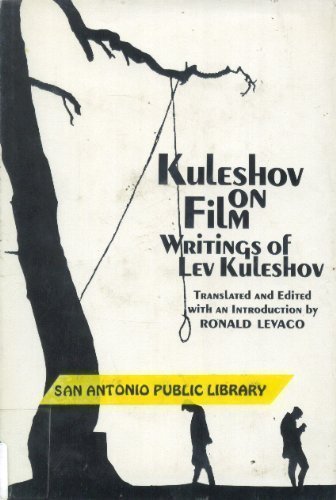Kuleshov on Film: Writings by Lev Kuleshov ebook
Par brown nicole le lundi, juillet 18 2016, 06:07 - Lien permanent
Kuleshov on Film: Writings by Lev Kuleshov by Lev Vladimirovich Kuleshov, Ronald Levaco


Kuleshov on Film: Writings by Lev Kuleshov Lev Vladimirovich Kuleshov, Ronald Levaco ebook
ISBN: 0520026594, 9780520026599
Page: 121
Format: pdf
Publisher: Univ of California Pr
Last week in my film studies class, I showed portions of The Cutting Edge: The Magic of Movie Editing, including a brief overview of montage theory and a recreation of the so-called Kuleshov Effect. Cowritten with Viktor Shklovsky, and featuring Aleksandra Khoklova I'll be writing more about this film here in the not-too-distant future. The idea that editing constitutes the “essence” of film art originated with the Russian director and theoretician Lev Kuleshov (1899-1970) who experimented with montage in the 1920s in an almost scientific fashion and is also one of the key exponents of the 'film as language' idea. If you already read my thoughts about this film on IMDb, there's no need to read this, since it's basically the same stuff I already said there (albeit with spoiler stuff). These studies began a continuous line of European philosophical works on film that stretched through to today's writings by Jacques Rancière and Slavoj Žižek. Pontypool And Other Zombie Films: Nothing To Do With The Living Dead · Hungry For Life, Thirsty For Lev Kuleshov was the grandfather of Russian Montage, often considered to be the world's first school of film theory. By the Law (Lev Kuleshov, 1926). The Kuleshov effect is a film editing technique that was recognised and demonstrated by Russian filmmaker Lev Kuleshov between 1910-1920 during his montage experiments. Po Lakonu by Lev Kuleshov: Better known for an eponymous montage principle than for his too-rarely-seen films, Kuleshov momentarily set aside his avant-garde proclivities with this 1926 screen adaptation of Jack London's The Unexpected. The Montage theorists, such P.S.: Hopefully this weekend I will be writing my epic rant on “JRPGs” as a genre; I was going to wait a while to do so, but Extra Credits have recently posted a three-part video series that I want to respond to. This argument can be traced back to the Soviet Montage movement in the 1920s, in particular, one Lev Kuleshov. For my It wasn't until he happened upon an American movie that he realised what Russian cinema was missing, what would influence one of the most significant film movements in history, what he would then believe to be the very essence of cinema itself Kuleshov theorised this as the Americans having more camera angles to keep them entertained.